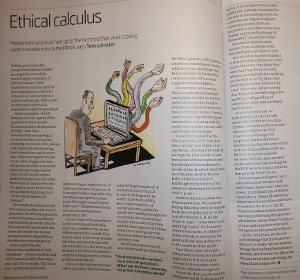New Scientist Article
Posted by Tom Leinster
I’ve got a full-page opinion piece in this week’s New Scientist, on why mathematicians should refuse to cooperate with agencies of mass surveillance. If you’re in the US, UK or Australia, it’s the print edition that came out yesterday.
The substance is much the same as my piece for the London Mathematical Society Newsletter, but it’s longer, and it’s adapted for a US readership too.
I don’t currently have much to add to the article or what I wrote about mathematicians and the secret services previously. But I do have some observations to make about the process of writing for New Scientist.
This was my first time writing for a magazine. The article received substantial edits from at least three editors; you can compare it with the version I originally submitted. I have mixed feelings about this process.
On the one hand, it’s great to have the input of experienced magazine journalists, and I can definitely see ways that they improved what I wrote. On the other hand — and despite the editors I dealt with being reasonable, helpful, and pleasant — I found the process pretty frustrating. I think that’s because of where the control lies.
What doesn’t happen is that you submit your piece, the editors read it and give you their critiques, and then you amend your article accordingly. What does happen is that you submit something, the editors change it how they like, and if you don’t like any of their changes, you have to argue for why it should be changed back. This process may be iterated several times, perhaps with different editors with different opinions. Rationally, I know that the article goes out not only under my name but also under the magazine’s, but by the end of the process, I did have the depressing feeling that the article wasn’t entirely mine.
(Small example: there were three words that I disliked and repeatedly removed from the editor’s edits: “moral”, “snoop” and “spook”. The editors I dealt with directly respected my wish to avoid them, after I’d made the case. But in the online version, the headline and the standfirst — which I neither wrote nor saw before publication — managed to use two out of those three words.)
Anyway, it was a new experience.
Comments are open. As ever, if you’re leaving comments on the political aspects, please keep them focused on the relationship between mathematicians and the secret services.
Update Here’s a list of the various press articles that followed on from my original article:
- Mathematician Spies, Slate, 27 April 2014. (Reprint of New Scientist article)
- Mathematicians: refuse to work for the NSA!, Boing Boing, 27 April 2014
- Mathematicians Push Back Against The NSA, Slashdot, 27 April 2014
- Un mathématicien appelle ses collègues à ne plus travailler pour la NSA, Mediapart, 28 April 2014 (free version here)
- Mathematiker ruft zum Geheimdienst-Boykott auf, Zeit Online, 28 April 2014
- Mathematiker-Aufruf: Arbeitet nicht für die Geheimdienste!, Spiegel Online, 28 April 2014.


Re: New Scientist Article
Tom,
your begins with ” … These organisations stand accused of law-breaking on an industrial scale and are now the object of widespread outrage”.
But actually I am surprised how little outrage there is/was in UK and US. Why do you think this is? In my opinion, understanding the widespread complacency about privacy violation(s) would be quite important if one wants to change anything in this area …